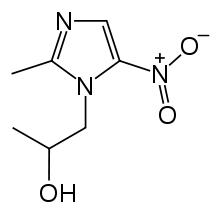Secnidazole
 | |
| Systematic (IUPAC) name | |
|---|---|
| 1-(2-methyl-5-nitro-1H-imidazol-1-yl)propan-2-ol | |
| Clinical data | |
| AHFS/Drugs.com | International Drug Names |
| Oral | |
| Identifiers | |
|
3366-95-8 | |
| P01AB07 | |
| PubChem | CID 71815 |
| ChemSpider |
64839 |
| UNII |
R3459K699K |
| KEGG |
D07353 |
| ChEMBL |
CHEMBL498847 |
| Synonyms | PM 185184, RP 14539 |
| Chemical data | |
| Formula | C7H11N3O3 |
| 185.180 g/mol | |
|
SMILES
| |
| |
| | |
Secnidazole (trade names Flagentyl, Sindose, Secnil) is a nitroimidazole anti-infective. Effectiveness in the treatment of dientamoebiasis has been reported.[1] It has also been tested against Atopobium vaginae.[2]
Secnidazole is structurally related to the commonly used 5-nitroimidazoles metronidazole and tinidazole. These drugs share a common spectrum of activity against anaerobic micro-organisms and they appear particularly effective in the treatment of amoebiasis, giardiasis, trichomoniasis and bacterial vaginosis. Secnidazole is rapidly and completely absorbed after oral administration and has a longer terminal elimination half-life (approximately 17 to 29 hours) than commonly used drugs in this class. In patients with intestinal amoebiasis or giardiasis, clinical or parasistological cure rates of 80 to 100% are achieved after treatment with a single dose of secnidazole 2 g (30 mg/kg in children), similar to the response rates achieved with multiple dosage regimens of metronidazole or tinidazole. Patients with hepatic amoebiasis appears to respond well to 5- to 7-day therapy with secnidazole, but the efficacy of this drug regimen requires further evaluation in larger numbers of patients. After administration of a single dose of secnidazole, parasitological eradication was achieved in approximately 92 to 100% of patients with urogenital trichomoniasis. Patients with bacteria vaginosis respond at least as well to a single dose of secnidazole as to single-dose tinidazole, or single- or 7-day treatment with metronidazole; clinical improvement and/or microbiological evidence of cure was attained in approximately 59 to 96% of patients. In the clinical trials reviewed, secnidazole was well tolerated; most adverse events were gastrointestinal in nature and did not require treatment intervention or withdrawal from therapy.
In summary, available evidence suggests that secnidazole is as efficacious as other 5-nitroimidazole drugs in the treatment of protozoal infections and bacterial vaginosis. The convenience and ease of administration associated with single-dose therapy, combined with a good tolerability profile, make secnidazole a suitable option to other single-dose treatments and an attractive alternative to multiple dosage regimens with other drugs in this class.
References
- ↑ Girginkardeşler, N.; Coşkun, S.; Cüneyt Balcioğlu, I.; Ertan, P.; Ok, U. Z. (2003). "Dientamoeba fragilis, a neglected cause of diarrhea, successfully treated with secnidazole". Clinical Microbiology and Infection 9 (2): 110–113. doi:10.1046/j.1469-0691.2003.00504.x. PMID 12588330.
- ↑ De Backer, E.; Dubreuil, L.; Brauman, M.; Acar, J.; Vaneechoutte, M. (2009). "In vitro activity of secnidazole against Atopobium vaginae, an anaerobic pathogen involved in bacterial vaginosis". Clinical Microbiology and Infection 16 (5): 470–472. doi:10.1111/j.1469-0691.2009.02852.x. PMID 19548924.
| ||||||||||||||||||||||||||||||||||||||||||||||||||||||